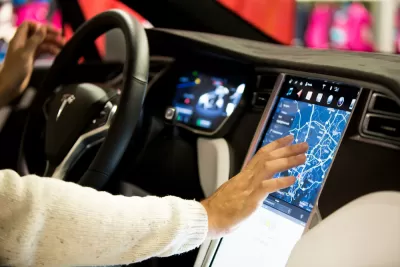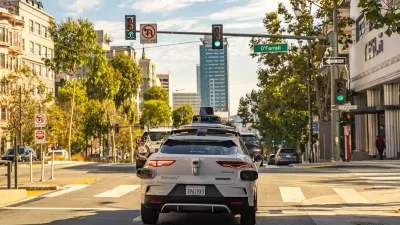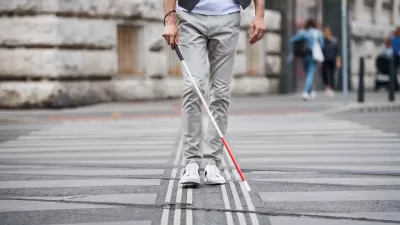Federal regulators are just starting to gain an understanding of how vehicles with automation systems impact traffic safety.

A federal report reveals a dearth of data about cars with advanced vehicle automation systems (ADAS), which “are involved in far more crashes than previously known,” writes Kea Wilson for Streetsblog.
“According to a new analysis from the National Highway Traffic Safety Administration, automakers reported 392 crashes in just 11 months among motorists who used “advanced driver assistance systems” within 30 seconds of an impact.” Until June 2021, automakers were not even required to report these crashes, and they are still not responsible for accounting for pedestrian safety.
“[T]he new trove of data raised particular questions about Tesla, which has become notorious for marketing itself as a path-breaking safety innovator despite a rash of high-profile crashes.” Wilson notes that almost 70 percent of ADAS involve Tesla vehicles.
“NHTSA announced last week that it’s expanding its investigation into Tesla’s misleadingly named ‘Autopilot’ and ‘Full Self Driving’ ‘advanced driver assistance’ systems to see whether they could be actually causing crashes by lulling drivers into a false sense of security behind the wheel of what they think are fully autonomous vehicles, but aren’t.” The article quotes Phil Koopman, an associate professor at Carnegie Mellon University, who suggests that the NHTSA “should be asking a lot more questions about the impact of ADAS on America’s traffic safety landscape” to understand how to effectively regulate the industry.
Comprehensively addressing autonomous vehicle safety, writes Wilson, “will require cities to think more deeply about designing safe roadway environments where no car is likely to kill.”
FULL STORY: Fed. AV Crash Report Underscores How Little We Know About Robocar Safety

Alabama: Trump Terminates Settlements for Black Communities Harmed By Raw Sewage
Trump deemed the landmark civil rights agreement “illegal DEI and environmental justice policy.”

Study: Maui’s Plan to Convert Vacation Rentals to Long-Term Housing Could Cause Nearly $1 Billion Economic Loss
The plan would reduce visitor accommodation by 25% resulting in 1,900 jobs lost.

Planetizen Federal Action Tracker
A weekly monitor of how Trump’s orders and actions are impacting planners and planning in America.

Waymo Gets Permission to Map SF’s Market Street
If allowed to operate on the traffic-restricted street, Waymo’s autonomous taxis would have a leg up over ride-hailing competitors — and counter the city’s efforts to grow bike and pedestrian on the thoroughfare.

Parklet Symposium Highlights the Success of Shared Spaces
Parklets got a boost during the Covid-19 pandemic, when the concept was translated to outdoor dining programs that offered restaurants a lifeline during the shutdown.

Federal Homelessness Agency Places Entire Staff on Leave
The U.S. Interagency Council on Homelessness is the only federal agency dedicated to preventing and ending homelessness.
Urban Design for Planners 1: Software Tools
This six-course series explores essential urban design concepts using open source software and equips planners with the tools they need to participate fully in the urban design process.
Planning for Universal Design
Learn the tools for implementing Universal Design in planning regulations.
Caltrans
Smith Gee Studio
Institute for Housing and Urban Development Studies (IHS)
City of Grandview
Harvard GSD Executive Education
Toledo-Lucas County Plan Commissions
Salt Lake City
NYU Wagner Graduate School of Public Service





























